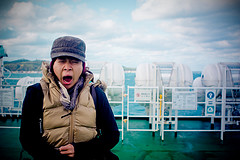6 Reasons to Get Plenty of Sleep When You Travel
29 November 2012
Human beings are not machines and we don’t keep going without breaks. Sleep is essential to our health and well-being.
Sleep study after sleep study shows shocking evidence of the physical and mental effects of even minor levels of sleep deprivation and a wide range of health conditions that result from loss of sleep.
For these reasons, it’s critical that travelers get plenty of sleep before and during their trips – to avoid some very critical and dangerous mistakes that can cost them their health, their financial security, or their lives.
How much sleep is enough?
According to WebMD, the amount of sleep a person needs depends on a number of factors, but in general the amount of sleep a person needs is determined by their age group:
- Infants need about 16 hours a day; toddlers between 12 and 14
- Kids need between 10 and 12 hours a day
- Teenagers require about 9 hours each day
- Most adults need 7 to 8 hours a day although some need as little as 5 or as many as 10
Psychologists and others who study sleep disorders have shown that many problems are directly tied to sleep deprivation. The following are 6 reasons to get plenty of sleep before and during your trip. A hint? It’s not just about being grumpy and a little foggy – it’s actually quite dangerous.
1. Memory problems
The body’s ability to sleep plays a critical role in your cognitive ability – that is your ability to think and to process information.
During sleep, while the body rests, the brain is busy processing information from the day and forming memories.Sleep is essential to the cognitive functions of the brain, and without it, our ability to consolidate memories, learn daily tasks, and make decisions is impaired.
Memory problems on your trip can mean lost luggage, missed connections, and an inability to find your hotel. Unfortunately, travel insurance isn’t likely to be able to help you if the loss you’re experiencing is because you forgot.
2. Weakened immune systems
It turns out that the ‘old wives’ tale’ that if you didn’t sleep well, you would get sick is essentially true.
Physicians know now that skipping our zzzs can increase our risk of getting sick and prolonged sleep deprivation has long been associated with diminished immune functions which leaves us more prone to catching colds, the flu, and everything else in between. Sleep loss also influences our body’s ability to fight an illness once it sets in.
Think about that when the guy in the next seat sneezes or coughs! Getting sick when you’re traveling can make things very difficult.
3. Increased stress levels
It’s been a long time since travel was fun – everything is overcrowded, the perks are few and far between, and well, let’s be honest, no one likes the TSA.
When you add the stress of travel to the increased stress on your body that results from lack of sleep, you essentially get the cortisol double-whammy. Super high levels of cortisol in your system that result from the lack of sleep drives up anxiety levels which places greater than average stress on the body.
You might be fine as long as everything goes perfectly on your trip and you can tumble into a comfortable bed when you arrive and catch up on your sleep, but there are no such guarantees.
4. Slowed reflexes
Sleep deprivation induces significant reductions in physical performance, including reflexes and fine motor skills.
According to the National Highway Traffic Safety Administration fatigue is responsible for an estimated 56,000 motor vehicle accidents and over 1,500 fatalities every year. Excessive sleepiness also contributes to a greater risk of sustaining an injury.
A traffic accident in a foreign country can be rough on your financial security. It’s important to note that car rental collision coverage through your credit card travel plan or your travel insurance plan does not extend to provide coverage for damage to another vehicle, structure, or person. If you cause an accident, you could very well be sued and in some countries, you could be jailed.
5. Poor judgement
Turns out, a lack of sleep can affect our interpretation of events. Essentially, those who are sleep-deprived do not make sound judgments because they cannot accurately assess the situation and act wisely.
Ironically, people who are running on little sleep seem to be especially prone to poor judgement when it comes to assessing how their lack of sleep is affecting them.
6. Skin aging
OK, this isn’t actually a ‘dangerous’ problem caused by sleep deprivation, but it sure would be nice to look our best at that business meeting or on a romantic evening on your vacation.
When you don’t get enough sleep, the body releases more of the stress hormone cortisol and in excess amounts, cortisol can break down skin collagen – the protein that keeps skin smooth and elastic.
It turns out that chronic sleep loss can lead directly to the formation of fine lines and lackluster skin. Of course, it also means dark circles under the eyes, and for some, eye-puffiness. Not your best look on a trip!
Myth Busted
It’s important to note that medical experts agree: caffeine and other stimulants cannot overcome the effects of severe sleep deprivation. That means you might be awake, but if you’re sleep deprived, you’re operating on a limited capacity no matter how many cups of joe you have pounding through your system.
Damian Tysdal is the founder of CoverTrip, and is a licensed agent for travel insurance (MA 1883287). He believes travel insurance should be easier to understand, and started the first travel insurance blog in 2006.

